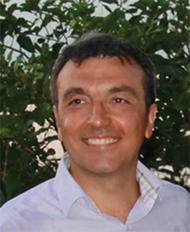Fuccio CRISTIANO
|
|
C’est avec une immense tristesse que nous avons appris le décès de notre collègue Fuccio Cristiano le 12 janvier 2024.
Fuccio était un expert internationalement reconnu dans le domaine de l’implantation ionique, du dopage des semi-conducteurs et des méthodes avancées pour leur caractérisation physique. Il avait obtenu sa thèse de doctorat à l’Université de Surrey en Angleterre en 1998. Il avait ensuite rejoint le CEMES pour un post-doctorat de 2 ans avant d’être recruté au CNRS en 2000 pour effectuer sa recherche au LAAS-CNRS dans le domaine de la physique des semi-conducteurs. Tout au long de sa carrière, il a participé à de très nombreux projets nationaux et à plus de dix projets européens. Il avait su mettre en place des collaborations pérennes avec le milieu industriel, notamment avec STMicroelectronics. Au sein du LAAS, il a été responsable de l’équipe MPN - Matériaux, procédés et nano-dispositifs puis directeur du département MNBT - Micro nano bio technologies. Doté de valeurs morales inébranlables, Fuccio a toujours été un collègue bienveillant, attentif aux autres, aimé de tous, et un pilier sur lequel chacun pouvait compter. En tant que Directeur de département, son caractère et sa bienveillance ont contribué à créer une atmosphère chaleureuse et conviviale qui perdure encore aujourd’hui. Pour beaucoup de ses collègues, Fuccio était également un ami exceptionnel. Toujours présent dans les bons comme dans les mauvais moments, sa gentillesse, sa disponibilité et son sourire ont laissé une empreinte indélébile. Les moments conviviaux partagés en dehors du laboratoire resteront des souvenirs précieux, joyeux et réconfortants. Même face à l'adversité de la maladie, il a continué à rayonner de positivité et de détermination. Le laboratoire perd un collègue et un ami qui s’est beaucoup investi pour le LAAS et pour la recherche scientifique. Nous gardons la mémoire d’un homme extrêmement attachant, bienveillant et toujours prêt à contribuer pour le bien du collectif. Sa disparition crée un vide immense au sein de notre laboratoire et dans notre communauté scientifique. Continuons à avancer dans ses pas avec la même détermination, la bienveillance et l'intégrité qu'il a toujours incarnées. |
|
It is with a profound sadness that we learned of the death of our colleague Fuccio Cristiano on 12 January 2024.
Fuccio has been an internationally recognised expert in the field of ion implantation, semiconductor doping and advanced methods for their physical characterisation. He obtained his PhD from the University of Surrey in England in 1998. He then joined CEMES for a 2-year post-doctorate before being recruited to the CNRS in 2000 to carry out his research at LAAS-CNRS in the field of semiconductor physics. Throughout his career, he has taken part in a large number of national projects and more than ten European projects. He has also established long-term collaborations with industry, in particular with STMicroelectronics. At LAAS, he was head of the MPN - Materials, Processes and Nano Devices team and then director of the MNBT - Micro Nano Bio Technologies Department. Endowed with unshakeable moral values, Fuccio was always a caring colleague, attentive to others, loved by all, and a pillar that everyone could count on. As Head of Department, his character and kindness helped to create a warm and friendly atmosphere that continues to this day. For many of his colleagues, Fuccio also was an exceptional friend. Always there through good times and bad ones, his kindness, availability and smile left an indelible mark. The convivial moments shared outside the laboratory will remain precious, joyful and comforting memories. Even in the face of the adversity of disease, he continued to radiate positivity and determination. The laboratory has lost a colleague and a friend who put a great deal of himself into LAAS and scientific research. We remember him as an extremely likeable, caring man who was always ready to contribute to the good of the community. His death is a huge loss to our laboratory and to our scientific community. Let us continue to follow in his footsteps with the same determination, benevolence and integrity that he always embodied. |

